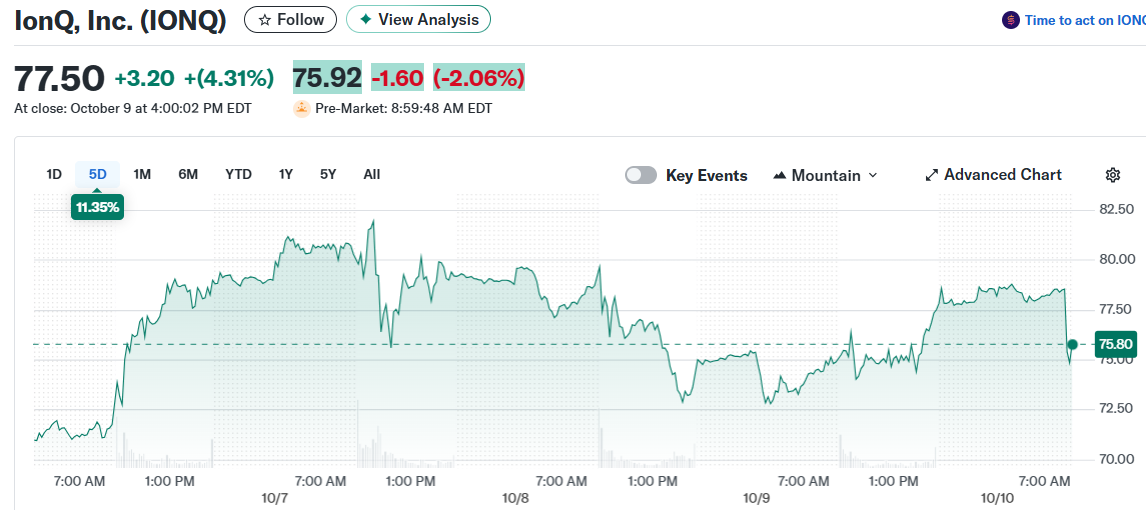TLDR
- IonQ stock gained 4.3% following completion of Vector Atomic acquisition and analyst price target of $100
- Trapped ion technology operates at room temperature with 99.97% gate fidelity, outperforming competitors
- Stock has surged 690% over past year but faces debate over $23 billion valuation
- Commercial viability expected around 2030 with revenue currently tied to research contracts
- Wall Street shows mixed opinions with average target of $61.63 versus Ellis’s $100 forecast
IonQ shares rose 4.3% on October 9 as the quantum computing company closed its Vector Atomic acquisition. The deal positions IonQ in the quantum sensing market for positioning, navigation, and timing applications.

B. Riley Securities analyst Craig Ellis maintained his $100 price target on the stock. That represents 29% upside from current trading levels.
The Vector Atomic deal closed on October 7. The acquisition targets defense, aerospace, and autonomous vehicle applications through advanced quantum sensors.
Ellis recently increased his price target from $75 to $100. He cited accelerating progress in quantum technology commercialization.
The five-star analyst noted the Department of Energy’s National Labs are shifting focus toward market-ready products. Experimental technology is moving toward practical commercial applications faster than anticipated.
Room Temperature Advantage
IonQ’s technical approach sets it apart from competitors. The company uses trapped ion technology that operates at room temperature.
Rivals Rigetti Computing and D-Wave rely on superconducting quantum computing. That method requires cooling particles to near absolute zero, making it more expensive.
IonQ’s accuracy measurements lead the industry. Its two-qubit gate fidelity reaches 99.97% compared to Rigetti’s 99.5%.
The 0.47% difference carries weight in quantum computing. Small accuracy improvements prove difficult to achieve but can change computational outcomes.
IonQ trades speed for accuracy. Its systems process slower than superconducting alternatives, but accuracy remains the critical factor for commercial success.
Sector Momentum Builds
Quantum computing stocks have posted dramatic gains recently. Rigetti shares jumped 191% while D-Wave climbed 118%.
IonQ has gained 690% over the past year and 77% in the past month alone. The stock now carries a $23 billion market valuation.
Some market observers warn of potential bubble conditions. The gains have come despite commercial applications remaining years away.
IonQ holds first-mover status as the first pure-play quantum computing company to go public. This could provide advantages as the technology matures.
Analyst Divide
Wall Street remains split on IonQ’s valuation. The stock holds a Moderate Buy consensus rating with six Buy and three Hold recommendations.
The average price target of $61.63 implies 20% downside from current levels. That creates a gap between bullish and bearish forecasts.
IonQ’s revenue still depends on research contracts rather than system sales. Sustainable revenue from product sales remains elusive.
The company points to 2030 as a key milestone for commercial viability. That puts meaningful commercialization roughly five years out.
Ellis believes the timeline could accelerate based on Department of Energy activities. The shift toward practical applications may speed adoption.
IonQ’s second-quarter results showed limited system sales. Revenue generation relies on research partnerships rather than computing unit sales.
The trapped ion approach could win the quantum computing race if accuracy proves more important than speed. Commercial success remains uncertain until the technology reaches market readiness.





